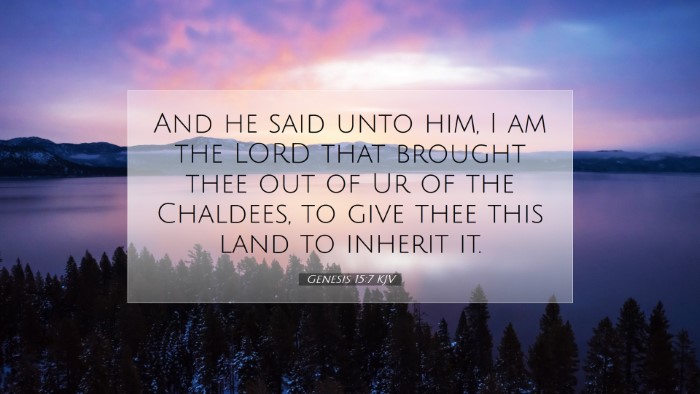Commentary on Genesis 15:7
Bible Verse: "And he said unto him, I am the LORD that brought thee out of Ur of the Chaldees, to give thee this land to inherit it." (Genesis 15:7)
This verse forms a critical junction in the life of Abram, establishing God’s covenant and reaffirming His sovereign choice in the unfolding of redemptive history. It not only highlights God’s faithfulness but also involves significant theological implications that are essential for understanding the broader narrative of Scripture.
Contextual Analysis
Genesis 15 finds Abraham (then Abram) amidst doubts concerning God's promises, particularly about progeny and land. The verse encapsulates God's assurance to Abram by reminding him of the deliverance from Ur and the promise of land, thereby addressing Abram’s fears about his heritage and future.
Insights from Commentators
Matthew Henry
Matthew Henry highlights the importance of God's remembrance of His covenant. He notes that God starts this reassurance by recalling Abram's past, emphasizing His active role in Abram’s life. God's statement, "I am the LORD," is a declaration of His sovereign identity, which carries with it the authority to fulfill His promises. Henry suggests that Abram's salvation story begins with God's call and his obedience, firmly rooting the beginning of faith in the divine initiative, rather than human merit.
Albert Barnes
Albert Barnes elaborates on the implications of being called out of Ur. He points out that Ur was a symbol of paganism, and God's calling signifies a transformation from worldly attachments to divine purpose. Barnes refers to God's promise of land as part of a greater covenant that anticipates the eventual fulfillment through the nation of Israel. He emphasizes God's intent to establish a lineage through Abram, which would ultimately lead to the Messiah. In this way, Barnes connects the promise made to Abram with the broader messianic expectation in the Old Testament.
Adam Clarke
Adam Clarke places a strong focus on the character of God as the deliverer. He interprets "brought thee out of Ur of the Chaldees" as a reflection of God's grace and strength, distancing Abram from his past. Clarke makes a point of discussing the significance of the land, noting that it symbolizes not just physical territory but spiritual inheritance. He notes that the mention of Ur prepares the reader to appreciate the stark contrast between Abram's old life and the future God is preparing for him, highlighting the transformative journey of faith that Abram undertakes.
Theological Implications
The promise of land in Genesis 15:7 serves to illustrate several core theological themes:
- The Sovereignty of God: This verse highlights that God is the orchestrator of history, sovereignly guiding Abram’s steps according to His divine plan.
- The Nature of Faith: Abram’s journey reflects the essence of faith as a response to God’s revelation, calling believers to trust in God’s unfailing promises.
- Covenant Theology: The reaffirmation of God’s covenant with Abram demonstrates the enduring nature of God’s promises, which are foundational to understanding God’s relationship with His people throughout the biblical narrative.
Practical Applications
For pastors and theologians, Genesis 15:7 emphasizes the importance of reminding congregations of God’s past faithfulness while fostering a hopeful anticipation of His future promises. It serves as a reminder to believers that God's call often involves a journey away from the familiar towards unknown valleys of faith where reliance on God becomes paramount.
- Encouragement in Doubt: Like Abram, believers often face uncertainties. Trusting in God’s past actions can strengthen one's faith.
- Transformational Faith: This passage challenges individuals to consider what they must leave behind to embrace God’s calling.
- Understanding Inheritance: It prompts reflection on spiritual inheritance and the Kingdom of God, citing believers’ place in God’s plan of redemption.
Conclusion
Genesis 15:7 is not merely a historical point in Abram's life but serves as a profound illustration of the interplay between God’s promises, human faith, and the unfolding narrative of redemption. As impacted by the insights of Henry, Barnes, and Clarke, the verse encourages a robust theological framework for understanding God’s character and His divine plans for humanity. It invites further exploration into the continuity of God's promises from Abram to the church today, encouraging all believers to move forward in faith.


